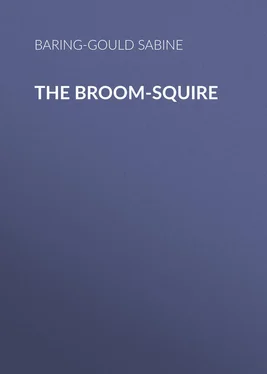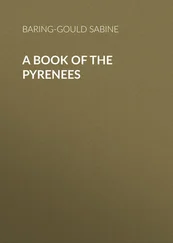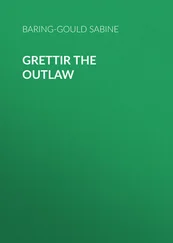Sabine Baring-Gould - The Broom-Squire
Здесь есть возможность читать онлайн «Sabine Baring-Gould - The Broom-Squire» — ознакомительный отрывок электронной книги совершенно бесплатно, а после прочтения отрывка купить полную версию. В некоторых случаях можно слушать аудио, скачать через торрент в формате fb2 и присутствует краткое содержание. ISBN: , Жанр: foreign_antique, foreign_prose, на английском языке. Описание произведения, (предисловие) а так же отзывы посетителей доступны на портале библиотеки ЛибКат.
- Название:The Broom-Squire
- Автор:
- Жанр:
- Год:неизвестен
- ISBN:http://www.gutenberg.org/ebooks/30354
- Рейтинг книги:3 / 5. Голосов: 1
-
Избранное:Добавить в избранное
- Отзывы:
-
Ваша оценка:
- 60
- 1
- 2
- 3
- 4
- 5
The Broom-Squire: краткое содержание, описание и аннотация
Предлагаем к чтению аннотацию, описание, краткое содержание или предисловие (зависит от того, что написал сам автор книги «The Broom-Squire»). Если вы не нашли необходимую информацию о книге — напишите в комментариях, мы постараемся отыскать её.
The Broom-Squire — читать онлайн ознакомительный отрывок
Ниже представлен текст книги, разбитый по страницам. Система сохранения места последней прочитанной страницы, позволяет с удобством читать онлайн бесплатно книгу «The Broom-Squire», без необходимости каждый раз заново искать на чём Вы остановились. Поставьте закладку, и сможете в любой момент перейти на страницу, на которой закончили чтение.
Интервал:
Закладка:
"I cannot see! O, I can see nothing! There is no light worth having!" he gasped, and proceeded to open the door in the lantern side.
"What is do be done?" he asked despairingly. "I do not know if it be dying or be in a fit. O! live! do, do live! I'll give you a brass button and some twine out of my pocket! I promise you my next lollipops if you will. Nasty, cross, disobliging thing." He went to the barn door and looked out, saw that the rain was coming down in torrents, came back. "Is it true," asked he, "that you must be a wanderer, if you die unchristened? Shall I ever hear you yowling in the wind? It is too, too dreadful!"
A chill came over the boy's heart.
Iver had never seen death. He was vastly frightened at the thought that the little soul might fleet away whilst he was watching. He dared not leave the child. He was afraid to stay. If he were to desert the babe, and it expired – and to run home, would not the soul come crying and flapping after him?
He considered with his hands to his head.
"I know what I will do!" exclaimed he, suddenly; "I'll make a
Christian of it, anyhow."
There was standing on the floor an old broken red bowl of coarse pottery, out of which fowls had been fed. It was now empty.
Iver took it, wiped it out with his hand, and went with it to the door, where a rude "launder" or shoot of wood carried the water from the thatch immediately over the door, and sent the collected moisture in a stream down one side. The boy held the vessel under the shoot till he had obtained sufficient for his purpose, and then, returning within, said, "I'll stop your wandering," went up to the child, sprinkled some water over it and said, "Mehetabel, I baptize thee – "
The cat made a spring and dashed past.
Down went the contents of the bowl over the babe, which uttered a howl lusty, loud enough to have satisfied any nurse that the baptism was valid, and that the devil was expelled.
CHAPTER VI
MEHETABEL IT MUST BE
In at the barn door came Mrs. Verstage, Iver's mother.
"Iver! Wot's up?"
"Oh, mother!"
"Where's that babe?"
"Here, mother, on the ground."
"On the ground! Good life! Sowsed, soaked through and through, whatever have you been doin'? Holdin' it under the spout?"
"Baptizin' it, mother."
"Baptizin' of it?" The woman stared.
"I thought the creetur was dyin'."
"Well, and wot then?"
"Mother. Lest it shud take to wanderin'."
"Baptizin' of it. Dear life! And what did you call it?"
"Mehetabel."
"Mehetabel! 'Taint a human name."
"It is, mother. It's a Scriptur name."
"Never heard on it."
"Mehetabel was the wife of Hadar."
"And who the dickens was Hadar?"
"He was a dook – a dook of Edom."
In the churchyard of Thursley stands a large white stone, on which is carved a medallion, that contains the representation of a man falling on the ground, with one arm raised in deprecation, whilst two men are robbing and murdering him, and a third is represented as acting sentinel lest the ruffians should be surprised. On the ground are strewn the garments of the man who is being killed. Beneath this rudely sculptured group is this inscription: —
I N M E M O R Y O F
A generous, but unfortunate Sailor,
Who was barbarously murdered on Hind Head,
On September 24th, 1786,
B Y T H R E E V I L L A I N S,
After he had liberally treated them and promised them his farther Assistance on the Road to Portsmouth.
In the "Royal Huts," a tavern, in which now very good entertainment for man and beast may be had, a tavern which stands somewhat further along the way to Portsmouth than Hind Head, may be seen at this day some rude contemporary paintings representative of the murder.
The ruffians after having killed their victim, robbed him, not only of his money, but also of his clothes, and hastened on their way.
A hue and cry were raised, when the corpse had been discovered, and the men were arrested upon the following day at Sheet, near Peterhead, and were found in possession of the clothing of the deceased. In due course of time they were tried at Kingston, and on the 7th of April, 1787, were hung and gibbeted in chains on Hind Head Hill, beside the old road and close to the scene of their crime.
A cross now marks the summit, and indicates the spot where stood the gallows, and a stone for some time pointed out the locality where the murder was committed. When, however, the new Portsmouth Road was cut further down the hill, skirting the Punch-Bowl at a lower level, then the stone was removed to the side of the new road. At present it is an object visited by vast numbers of holiday-makers, who seem to take almost as lively an interest in the crime that was committed over a century ago as if it were an event of the present day. At the time the murder aroused the greatest possible excitement in the neighborhood, and pre-eminently in the parish of Thursley.
As may be gathered from the wording of the inscription on the tombstone that covers the victim, his name never transpired. No relations claimed the right to bury him. None appeared to take charge of his orphan child.
The parish fretted, it fumed, it protested. But fret, fume, and protest availed nothing, it had to defray the cost of the funeral, and receive and lap the child in its parochial mercies.
A deceased wife's sister undoubtedly existed somewhere. Such was the conviction of every parishioner. The poor man was on his way to Portsmouth to deposit his child with her when the tragic event took place. Why did she not come forward? Why did she hold her tongue?
Had there existed in her bosom one particle of natural feeling she would not have remained mute and motionless, and allowed the parish to bury her brother-in-law and encumber itself with her niece.
So the parish talked, appealingly, argumentatively, blusteringly, objurgatively, but all to no purpose. The deceased wife's sister kept mum, and invisible. Reluctantly, resentfully, the parish was finally obliged to face the facts, pay the expenses of the interment, and settle that a weekly dole should be afforded for the maintenance of the child, and as that deceased wife's sister did not appear, the parochial bile overflowed upon the hapless babe, who came to be regarded as an incubus on the ratepayers and a general nuisance.
The one difficulty that solved itself – ambulando, was that as to who would take charge of the child. That was solved by the hostess of the Ship.
The parish endeavored to cajole the good woman into receiving the babe as a gift from Heaven, and to exact no compensation for her labors in rearing it, for the expense of clothing, feeding, educating it. But Mrs. Verstage was deaf to such solicitations. She would take charge of the child, but paid she must be. Eventually the parochial authorities, after having called a vestry, and sat three hours in consultation, and to "knuckle under," as the hostess expressed it, and allow a trifle for the entertainment of the little waif.
So the matter was settled.
Then another had to be determined. What about the christening performed in the shed by Iver? What about the outlandish name given the child? The landlady raised no question on these heads till it was settled that the little being was to be an inmate of her house, and under her care. Then she reasoned thus – "Either this here child be a Mehetabel or she bain't. Either it's a Christian or it's a heathen. What is it? Is it fish, is it flesh, or is it good red herring? It ain't no use my calling her Mehetabel if she bain't nothing of the sort. And it ain't no use teachin' her the caterplasm, if she ha'n't been made a Christian. I'll go and ax the pa'son."
Accordingly the good woman took Iver by the shoulder and dragged him to Witley Vicarage, and stated her case and her difficulties. The Vicar had already had wind of what had occurred. Thursley was at the period a chapelry in the extensive parish of Witley, and the church therein had, before the Reformation, been regularly served by the monks of Witley Abbey. It was afterwards more or less irregularly supplied with sacred ministrations from the mother-church, and had no resident pastor.
Читать дальшеИнтервал:
Закладка:
Похожие книги на «The Broom-Squire»
Представляем Вашему вниманию похожие книги на «The Broom-Squire» списком для выбора. Мы отобрали схожую по названию и смыслу литературу в надежде предоставить читателям больше вариантов отыскать новые, интересные, ещё непрочитанные произведения.
Обсуждение, отзывы о книге «The Broom-Squire» и просто собственные мнения читателей. Оставьте ваши комментарии, напишите, что Вы думаете о произведении, его смысле или главных героях. Укажите что конкретно понравилось, а что нет, и почему Вы так считаете.












